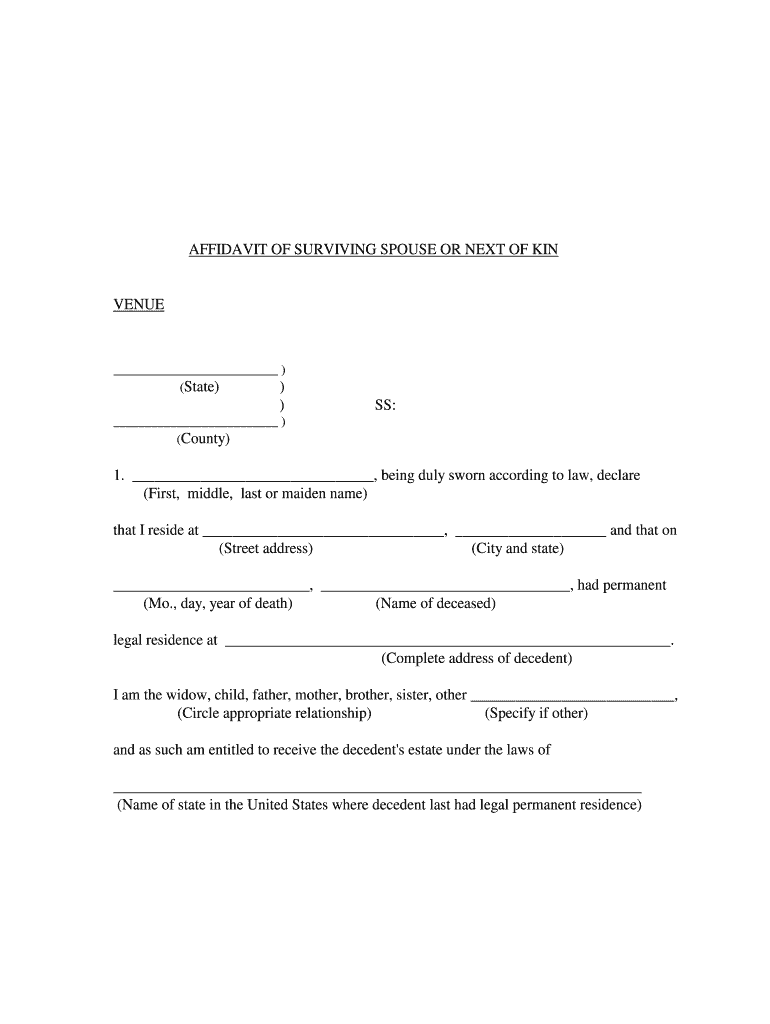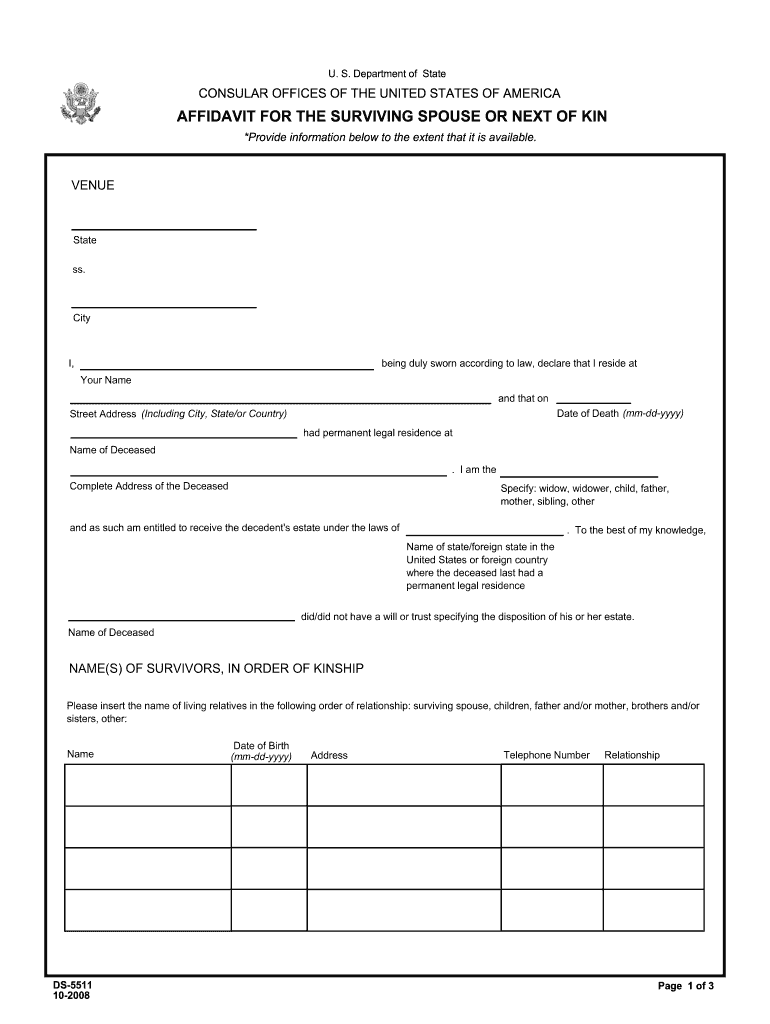An Overview of Alaska Next of Kin Law
In Alaska, next of kin law determines who will inherit a person’s assets and responsibilities after their death, especially if there is no will. It’s crucial to understand how the law defines next of kin, as it plays a significant role in both legal and personal matters. Whether dealing with estates, making medical decisions, or navigating disputes, having clarity on the rules can help prevent confusion and conflicts.
Who Qualifies as Next of Kin in Alaska?

In Alaska, the next of kin typically refers to the closest blood relatives of a deceased person. This hierarchy is established by law to determine who can inherit or make decisions if the deceased has not left a will. The list usually follows this order:
- Spouse: If the person was married, their spouse would typically be first in line.
- Children: If there is no spouse, biological and legally adopted children are next.
- Parents: If there are no children or spouse, the parents of the deceased inherit.
- Siblings: In the absence of parents, siblings may be considered next of kin.
- Extended family: More distant relatives, such as grandparents, aunts, uncles, or cousins, may inherit if there are no immediate family members.
This hierarchy can become complex in certain situations, such as in blended families or where distant relatives have closer relationships. It’s essential to confirm the legal standing of each family member to ensure proper inheritance or decision-making rights.
Rights and Responsibilities of the Next of Kin

The next of kin in Alaska not only inherits assets but also has several legal responsibilities. These can include:
- Handling the estate: The next of kin may be responsible for administering the deceased’s estate, paying off debts, and distributing assets.
- Making medical decisions: If the person was incapacitated before death, the next of kin may have been responsible for making healthcare decisions.
- Funeral arrangements: Organizing and paying for funeral services can fall on the next of kin, especially in the absence of pre-arranged plans.
- Legal disputes: In some cases, the next of kin may need to resolve disputes, such as those involving other family members, creditors, or competing claims on the estate.
Being designated as the next of kin comes with significant authority, but it can also bring challenges, especially when managing complex estates or medical situations. Consulting with a legal professional can help navigate these responsibilities effectively.
Inheritance Laws for Next of Kin in Alaska

In Alaska, inheritance laws play a significant role when someone passes away without a will, commonly referred to as dying “intestate.” The state’s laws outline exactly how the deceased’s property will be distributed among surviving family members. These laws help ensure that assets are passed on fairly according to a predetermined order of priority.
The inheritance process follows a set hierarchy:
- Spouse and Children: The spouse and children are typically the primary beneficiaries. If the deceased was married with children from the same marriage, the spouse usually inherits the majority of the estate, with children receiving the rest. If there are children from another relationship, the estate may be split between the spouse and children from both relationships.
- Parents: If there is no surviving spouse or children, the parents of the deceased inherit the estate equally.
- Siblings: In cases where neither parents nor descendants exist, the siblings of the deceased may inherit.
- Distant relatives: When immediate family members are not present, more distant relatives such as cousins, aunts, or uncles may inherit the estate.
This hierarchy is designed to protect the deceased’s assets, ensuring they are passed to family members instead of becoming part of the state’s property. However, the laws may vary based on specific family circumstances, so it’s essential to understand how Alaska’s rules apply to individual situations.
What Happens When There is No Will?
When someone passes away without a will in Alaska, the state’s intestacy laws come into effect. Intestacy refers to the situation where a person dies without legally outlining how their assets should be distributed. Without a will, the state decides who will inherit, often following a strict next-of-kin hierarchy.
Here’s a breakdown of what typically happens:
- Spouse’s share: If the deceased was married, the spouse usually inherits the majority of the estate. If there are no children from another relationship, the spouse may inherit everything.
- Children’s share: If there are children from a different relationship, the estate will often be divided between the spouse and those children.
- Parents and siblings: If there is no spouse or children, the estate goes to the deceased’s parents. If the parents are no longer living, it will go to siblings.
- Estate to the state: If no relatives can be found, the estate may eventually be transferred to the state of Alaska.
When there is no will, it can lead to unexpected outcomes, such as distant relatives inheriting or even disputes within the family. It’s always advisable to create a will to ensure your assets are distributed according to your wishes, but if this isn’t done, Alaska’s intestacy laws provide a fallback plan.
How the Next of Kin Can Claim Assets
Claiming assets as the next of kin in Alaska typically requires following a legal process to ensure all rights and responsibilities are respected. Depending on the size and complexity of the estate, the procedure may vary, but here are some common steps involved:
- File a death certificate: Before any legal action, you must obtain the deceased’s death certificate, which serves as an official document confirming their passing.
- Submit a petition for probate: For larger estates, you may need to file a petition for probate in the court. This process allows the court to oversee the distribution of the estate and ensure everything is handled legally.
- Small estate affidavit: If the estate is under a certain value, Alaska offers a simplified process through a small estate affidavit. This allows next of kin to claim assets without a lengthy probate process.
- Pay outstanding debts: The next of kin must ensure all debts, including taxes and liabilities, are paid before claiming any assets.
- Distribute the remaining estate: Once the debts are settled, the remaining assets can be distributed according to Alaska’s inheritance laws or any existing will.
The process can be complex, especially for larger estates, so working with a legal professional can help ensure everything is done according to Alaska’s rules. Claiming assets efficiently requires attention to both the law and the family’s needs.
Legal Limitations and Disputes Among Next of Kin
Although next of kin have specific rights when a family member passes away, there are also legal limitations that can create disputes. These disputes often arise when there are disagreements over the interpretation of the law or when multiple relatives believe they have a right to the deceased’s assets. Understanding these limitations is key to avoiding conflict.
Some common causes of disputes include:
- Contesting a will: Family members may challenge the validity of a will, arguing that it was made under undue influence, or that the deceased was not of sound mind when drafting it.
- Disputes over inheritance shares: Disagreements can occur when family members feel that assets are not being distributed fairly, particularly in cases where stepchildren or distant relatives are involved.
- Mismanagement of estate: The next of kin responsible for managing the estate may face legal challenges if other relatives believe the estate is being mismanaged or mishandled.
- Creditor claims: Before assets can be distributed, debts must be paid. Disputes may arise over which debts are legitimate or whether certain assets should be sold to cover liabilities.
In Alaska, legal limitations also include how property is divided. For example, while next of kin have inheritance rights, they may not always receive the assets they expect, especially when the deceased has significant debts. Legal representation is often necessary to resolve these complex situations and ensure a fair outcome.
Role of Next of Kin in Medical Decisions
Next of kin also have a vital role in medical decisions, particularly when a loved one is unable to make decisions for themselves. In Alaska, if a person becomes incapacitated and has not designated a healthcare proxy, the next of kin is often the one tasked with making crucial medical decisions.
The types of medical decisions a next of kin may have to make include:
- Consent for treatment: If the individual is unable to give consent, the next of kin may need to approve or deny medical procedures based on the person’s best interests or known wishes.
- End-of-life care: In some cases, next of kin may be required to make difficult decisions regarding life support, palliative care, or other end-of-life choices.
- Organ donation: If the deceased did not make their wishes known regarding organ donation, the next of kin may be asked to decide.
- Access to medical records: The next of kin may also be granted access to medical records to better understand the person’s condition and history.
It’s important to note that while next of kin typically have the authority to make these decisions, conflicts can arise, especially if other family members disagree with the choices being made. In such cases, medical professionals may look to the court to resolve disputes.
Frequently Asked Questions About Alaska Next of Kin Law
Alaska’s next of kin laws can be complex, especially for those unfamiliar with the legal terms and processes. Below are some frequently asked questions to provide clarity on the subject:
-
- Who is considered next of kin in Alaska?
In Alaska, next of kin is usually the closest living relative, such as a spouse, children, parents, or siblings. The hierarchy is followed according to state law.
-
- Do stepchildren have rights under next of kin laws?
Stepchildren are generally not considered next of kin unless they have been legally adopted by the deceased. Otherwise, they do not have the same inheritance rights as biological or adopted children.
-
- What happens if the deceased has no surviving next of kin?
If no next of kin can be identified, the estate may be passed to more distant relatives. If none can be found, the assets may eventually go to the state of Alaska.
-
- Can next of kin refuse their role?
Yes, next of kin can refuse to act as the personal representative of the estate or make medical decisions, in which case the court may appoint another suitable individual.
Understanding these basic principles of Alaska’s next of kin law can help families avoid misunderstandings and plan for the future.
Conclusion on Alaska Next of Kin Law
Alaska’s next of kin laws provide a structured approach to inheritance, medical decisions, and the handling of a deceased person’s estate when no will is present. Understanding who qualifies as next of kin, their legal rights, and the responsibilities they carry can help families navigate difficult times with more clarity. While these laws aim to ensure fair distribution of assets, they can also lead to disputes, highlighting the importance of having proper legal guidance and clear estate planning. Knowing the rules ahead of time can help prevent conflict and protect the interests of all involved.


